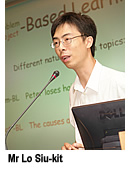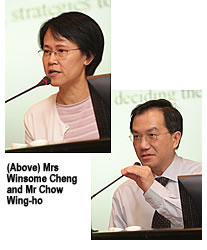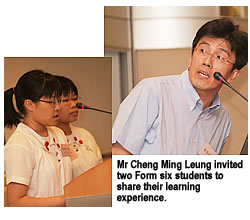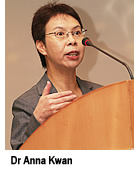Secondary school teachers share problem-based learning experience
Wang Feng and Grace Ho
Mrs Winsome Cheng, Deputy Principal of Wa Ying College, said PBL was a systematic method that could be applied in secondary schools. “The results are very positive for both teachers and students,” she said. “Teachers have found new ways of teaching, students get more involved in the learning process, and students’ communication skills and team spirit have improved significantly.”
Mrs Cheng herself got new insights for teaching and curriculum development from PBL. She believed PBL was in line with the spirit of liberal studies and could help students think independently and critically, and thus prepare them to embrace future studies.
A colleague of Mrs Cheng, Mr Chow Wing-ho, said: “We conducted surveys before and after introducing PBL. The results were very encouraging. All participating students have made progress – those who in the past have not performed well have improved greatly,” he said.
Mr Cheng Ming-leong, a teacher of St Clare’s Girls’ School, witnessed the benefits of PBL during his postgraduate studies, and therefore enthusiastically applied it to his teaching. “Stimulated by an active and interactive learning environment, we can see and feel the real changes in the students. Not only have students played a more active role in class which has in turn created a more dynamic atmosphere, but they can now formulate more complex and challenging questions,” he said.
The guest of honour Dr K K Chan, Principal Assistant Secretary (Curriculum Development) of the Education and Manpower Bureau, presented certificates to teachers who had completed the three-day programme, A Learning to Learn Facilitator Programme for Secondary School Teachers.
“Though PBL originates from universities, it is not exclusive to higher education. In fact, it can be applied in secondary and even elementary schools, and in all kinds of subjects,” Dr Kwan said, adding that in the present information-rich era, it is more important to teach students to fish, than to feed them fishes.
The two-year Learning to Learn: Preparing Students for Lifelong Learning QEF project led by Dr. Kwan will be completed by 2006. The project aims to strengthen teachers’ understanding in PBL, and help teachers master PBL skills in order to improve the traditional classroom teaching methods. PBL helps create an environment in which students can master how to build experiences and become a lifelong learner to cope with the challenges in the future.
CityU is committed to strengthening links with secondary schools in order to develop quality education in





